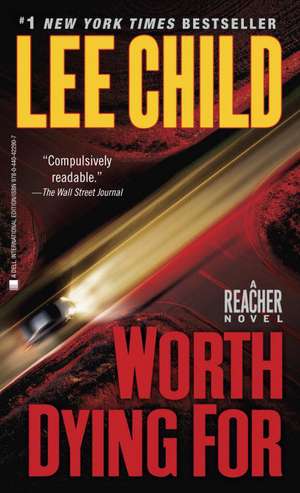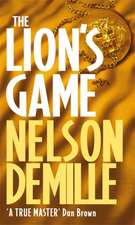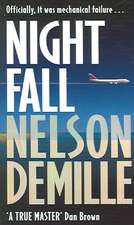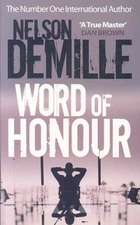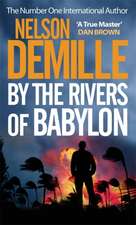Worth Dying For
Autor Lee Childen Limba Engleză Paperback – apr 2011
| Toate formatele și edițiile | Preț | Express |
|---|---|---|
| Paperback (4) | 56.48 lei 24-30 zile | +24.63 lei 4-10 zile |
| Transworld Publishers Ltd – 4 aug 2011 | 56.48 lei 24-30 zile | +24.63 lei 4-10 zile |
| Transworld Publishers Ltd – 4 aug 2011 | 58.11 lei 3-5 săpt. | +11.65 lei 4-10 zile |
| dell – 31 mar 2011 | 61.85 lei 3-5 săpt. | |
| Bantam – 6 aug 2012 | 100.83 lei 3-5 săpt. |
Preț: 55.29 lei
Nou
Puncte Express: 83
Preț estimativ în valută:
10.58€ • 11.08$ • 8.75£
10.58€ • 11.08$ • 8.75£
Carte indisponibilă temporar
Doresc să fiu notificat când acest titlu va fi disponibil:
Se trimite...
Preluare comenzi: 021 569.72.76
Specificații
ISBN-13: 9780440422907
ISBN-10: 0440422906
Pagini: 513
Dimensiuni: 106 x 175 x 35 mm
Greutate: 0.25 kg
Editura: Random House
ISBN-10: 0440422906
Pagini: 513
Dimensiuni: 106 x 175 x 35 mm
Greutate: 0.25 kg
Editura: Random House
Notă biografică
Lee Child is the author of seventeen Jack Reacher thrillers, including the New York Times bestsellers Persuader, The Enemy, One Shot, and The Hard Way, and the #1 bestsellers The Affair, Worth Dying For, 61 Hours, Gone Tomorrow, Bad Luck and Trouble, and Nothing to Lose. His debut, Killing Floor, won both the Anthony and the Barry awards for Best First Mystery, and The Enemy won both the Barry and Nero awards for Best Novel. Foreign rights in the Reacher series have sold in more than forty territories. All titles have been optioned for major motion pictures. A native of England and a former television director, Child lives in New York City, where he is at work on his next thriller.
Descriere
Descriere de la o altă ediție sau format:
Featuring Jack Reacher, hero of the blockbuster movie starring Tom Cruise, in an explosive follow-up to the cliffhanger ending of 61 Hours.
Has Jack Reacher finally met his match?
61 Hours ended with Reacher trapped in a desperate situation from which escape seemed impossible. Even for him.
Was that really the end of the road for the maverick loner?
Extras
CHAPTER NINE
Reacher checked the window. There were four tires in total, big knobbly off-road things, all of them on a Ford pick-up truck. The truck had a jacked suspension and lights on a roof bar and a snorkel air intake and a winch on the front. There were two large shapes in the gloom inside. The shapes had thick necks and huge shoulders. The truck nosed slowly down the row of cabins and stopped twenty feet behind the parked Subaru. The headlights stayed on. The engine idled. The doors opened. Two guys climbed out.
They both looked like Brett, only bigger. Late twenties, easily six-six or six-seven, probably close to three hundred pounds each, big waists made tiny by huge chests and arms and shoulders. They had cropped hair and small eyes and fleshy faces. They were the kind of guys who ate two dinners and were still hungry afterward. They were wearing red Cornhuskers football jackets made gray by the blue light from the cabin’s eaves.
The doctor’s wife joined Reacher at the window.
"Sweet Jesus," she said.
Reacher said nothing.
The two guys closed the truck’s doors and stepped back in unison to the load bed and unlatched a tool locker bolted across its width behind the cab. They lifted the lid and one took out an engineer’s ball-peen hammer and the other took out a two-headed wrench at least a foot and a half long. They left the lid open and walked forward into the truck’s headlight wash and their shadows jumped ahead of them. They were light on their feet and nimble for their size, like football players usually were. They paused for a moment and looked at the cabin’s door, and then they turned away.
Toward the Subaru.
They attacked it in a violent frenzy, an absolute blitzkrieg, two or three minutes of uncontrolled smashing and pounding. The noise was deafening. They smashed every shard of glass out of the windshield, they smashed the side windows, the back window, the headlights, the tail lights. They hammered jagged dents into the hood, into the doors, into the roof, into the fenders, into the tailgate. They put their arms through the absent glass and smashed up the dials and the switches and the radio.
Shit, Reacher thought. There goes my ride.
US"My husband’s punishment," the doctor’s wife whispered. "Worse this time."
The two guys stopped as suddenly as they had started. They stood there, one each side of the wrecked wagon, and they breathed hard and rolled their shoulders and let their weapons hang down by their sides. Pebbles of broken automotive glass glittered in the neon and the boom and clang of battered sheet metal echoed away to absolute silence.
Reacher took off his coat and dumped it on the bed.
The two guys formed up shoulder to shoulder and headed for the cabin’s door. Reacher opened it up and stepped out to meet them head on. Win or lose, fighting inside would bust up the room, and Vincent the motel owner had enough problems already.
The two guys stopped ten feet away and stood there, side by side, symmetrical, their weapons in their outside hands, four cubic yards of bone and muscle, six hundred pounds of beef, all flushed and sweating in the chill.
Reacher said, "Pop quiz, guys. You spent four years in college learning how to play a game. I spent thirteen years in the army learning how to kill people. So how scared am I?”
No answer.
"And you were so bad at it you couldn’t even get drafted afterward. I was so good at it I got all kinds of medals and promotions. So how scared are you?”
"Not very," said the guy with the wrench.
Wrong answer. But understandable. Being a good enough guard or tackle in high school to get a full-boat free ride to the big school in Lincoln was no mean achievement. Playing even a cameo role on the field in Memorial Stadium made a guy close to the best of the best. And failing to make the National Football League was no kind of real disgrace. The dividing line between success and failure in the world of sports was often very narrow, and the reasons for falling on one side or the other were often very arbitrary. These guys had been the elite for most of twenty years, the greatest thing their neighborhood had ever seen, then their town, then their county, maybe their state. They had been popular, they had been feted, they had gotten the girls. And they probably hadn’t lost a fight since they were eight years old.
Except they had never had a fight. Not in the sense meant by people paid to fight or die. Pushing and shoving at the schoolyard gate or on the sidewalk outside the soda shop or late at night after a start-of-summer keg party was as far from fighting as two fat guys tossing lame spirals in the park were from the Superbowl. These guys were amateurs, and worse, they were complacent amateurs, accustomed to getting by on bulk and reputation alone. In the real world, they would be dead before they even landed a blow.
Case in point: bad choice of weapons. Best are shooting weapons, second best are stabbing weapons, third best are slashing weapons. Blunt instruments are way down the list. They slow hand speed. Their uncontrolled momentum is disadvantageous after a miss. And: If you have to use them, the backhand is the only way to go, so that you accelerate and strike in the same sudden fluid motion. But these guys were shoulder to shoulder with their weapons in their outer hands, which promised forehand swings, which meant that the hammer or the wrench would have to be swung backward first, then stopped, then brought forward again. The first part of the move would be a clear telegraph. All the warning in the world. No surprise. They might as well put a notice in the newspaper, or send a cable by Western Union.
Reacher smiled. He had been raised on military bases all around the world, battling hardcore Marine progeny, honing his skills against gangs of resentful native youths in dusty Pacific streets and damp European alleys. Whatever hardscrabble town in Texas or Arkansas or Nebraska these guys had come up in had been a feather bed by comparison. And while they had been studying the playbook and learning to run and jump and catch, he had been broken down and built back up by the kind of experts who could snap your neck so fast you never knew it had happened until you went to nod your head and it rolled away down the street without you.
The guy with the wrench said, "We’ve got a message for you, pal."
Reacher said, "Really?"
"Actually it’s more of a question."
"Any difficult words? You need more time?" Reacher stepped forward and a little to his right. He put himself directly in front of the two guys, equidistant, seven feet away, so that if he was six on a clock face, they were eleven and one. The guy with the wrench was on his left, and the guy with the hammer was on his right.
The guy with the wrench moved first. He dumped his weight on his right foot and started a short, compact backswing with the heavy metal tool, a backswing that looked designed to bounce off tensed muscles after perhaps forty degrees or a couple of feet, and then snap forward again through a low horizontal arc, aiming to break Reacher’s left arm between the shoulder and the elbow. The guy wasn’t a total idiot. It was a decent first try.
But it was uncompleted.
Reacher had his weight on his left foot, and he had his right foot moving a split second after the wrench, driving the same way at the same speed, maybe even a little faster, and before the wrench stopped moving backward and started moving forward the heel of Reacher’s boot met the big guy’s knee and drove right through it, smashing the kneecap deep into the joint, bursting it, rupturing ligaments, tearing tendons, dislocating the joint, turning it inside out, making it fold forward the way no knee is designed to go. The guy started to drop and before he was past the first vertical inch and before the first howl was starting in his throat Reacher was stepping past him, on the outside, shouldering him aside, deleting him from memory, forgetting all about him. He was now essentially an unarmed one-legged man, and one-legged men had never featured near the top of Reacher’s concerns.
The guy with the hammer had a split-second choice to make. He could spin on the forehand, but that would give him almost a full circle to move through, because Reacher was now almost behind him, and anyway his crippled buddy was in the way of the spin, just waiting helplessly for a face to face collision. Or the guy could flail on the backhand, a Hail Mary blind swing into the void behind him, hoping for surprise, hoping for a lucky contact.
He chose to flail behind him.
Which Reacher was half-expecting and wholly rooting for. He watched the lunge, the arm moving, the wrist flicking back, the elbow turning inside out, and he planted his feet and jerked from the waist and drove the heel of his hand into the knob of the guy’s elbow, that huge force jabbing one way, the weight of the swinging hammer pulling the other way, the elbow joint cracking, the wrist overextending, the hammer falling, the guy instantly crumpling and dancing and hopping and trying to force his body to a place where his elbow stayed bent the right way around, which pulled him through a tight counterclockwise circle and left him unsteady and unbalanced and face to face with Reacher, who paused less time than it took for the hammer to hit the floor and then head butted him hard in the face, a savage, snapping movement, solid bone-to-bone contact, and then Reacher danced away toward the wrecked Subaru and turned and planned the next second and a half.
The guy who had held the wrench was down, rolling around, in Reacher’s judgment stunned not so much by the pain, most of which would be still to come, but by the awful dawning knowledge that life as he knew it was over, the momentary fears he might have experienced as an athlete after a bad on-field collision finally come true, his future now holding nothing but canes and braces and limps and pain and frustration and unemployment. The guy who had held the hammer was still on his feet, back on his heels, blinking, his nose pouring blood, one arm limp and numb, his eyes unfocused, not a whole lot going on his head.
Enough, a person might say, if that person lived in the civilized world, the world of movies and television and fair play and decent restraint. But Reacher didn’t live there. He lived in a world where you don’t start fights but you sure as hell finish them, and you don’t lose them either, and he was the inheritor of generations of hard-won wisdom that said the best way to lose them was to assume they were over when they weren’t yet. So he stepped back to the guy who had held the hammer and risked his hands and his arms and crashed a low right hook into the skinny triangle below the guy’s pectorals and above his six-pack abdominals, a huge blow, timed and jerked and delivered to perfection, straight into the solar plexus, hitting it like a switch, and the guy went into all kinds of temporary distress and sagged forward and down. Reacher waited until he was bent low enough for the finishing kick to the face, delivered hard but with a degree of mercy, in that smashed teeth and a busted jaw were better than out-and-out brain damage.
Then he turned to the guy who had held the wrench and waited until he rolled the right way and put him to sleep with a kick to the forehead. He picked up the wrench and broke the guy’s wrist with it, one, and then the other wrist, two, and turned back and did the same to the guy who had held the hammer, three, four. The two men were somebody’s weapons, consciously deployed, and no soldier left an enemy’s abandoned ordnance on the field in working order.
The doctor’s wife was watching from the cabin door, all kinds of terror in her face.
"What?" Reacher asked her.
Reacher checked the window. There were four tires in total, big knobbly off-road things, all of them on a Ford pick-up truck. The truck had a jacked suspension and lights on a roof bar and a snorkel air intake and a winch on the front. There were two large shapes in the gloom inside. The shapes had thick necks and huge shoulders. The truck nosed slowly down the row of cabins and stopped twenty feet behind the parked Subaru. The headlights stayed on. The engine idled. The doors opened. Two guys climbed out.
They both looked like Brett, only bigger. Late twenties, easily six-six or six-seven, probably close to three hundred pounds each, big waists made tiny by huge chests and arms and shoulders. They had cropped hair and small eyes and fleshy faces. They were the kind of guys who ate two dinners and were still hungry afterward. They were wearing red Cornhuskers football jackets made gray by the blue light from the cabin’s eaves.
The doctor’s wife joined Reacher at the window.
"Sweet Jesus," she said.
Reacher said nothing.
The two guys closed the truck’s doors and stepped back in unison to the load bed and unlatched a tool locker bolted across its width behind the cab. They lifted the lid and one took out an engineer’s ball-peen hammer and the other took out a two-headed wrench at least a foot and a half long. They left the lid open and walked forward into the truck’s headlight wash and their shadows jumped ahead of them. They were light on their feet and nimble for their size, like football players usually were. They paused for a moment and looked at the cabin’s door, and then they turned away.
Toward the Subaru.
They attacked it in a violent frenzy, an absolute blitzkrieg, two or three minutes of uncontrolled smashing and pounding. The noise was deafening. They smashed every shard of glass out of the windshield, they smashed the side windows, the back window, the headlights, the tail lights. They hammered jagged dents into the hood, into the doors, into the roof, into the fenders, into the tailgate. They put their arms through the absent glass and smashed up the dials and the switches and the radio.
Shit, Reacher thought. There goes my ride.
US"My husband’s punishment," the doctor’s wife whispered. "Worse this time."
The two guys stopped as suddenly as they had started. They stood there, one each side of the wrecked wagon, and they breathed hard and rolled their shoulders and let their weapons hang down by their sides. Pebbles of broken automotive glass glittered in the neon and the boom and clang of battered sheet metal echoed away to absolute silence.
Reacher took off his coat and dumped it on the bed.
The two guys formed up shoulder to shoulder and headed for the cabin’s door. Reacher opened it up and stepped out to meet them head on. Win or lose, fighting inside would bust up the room, and Vincent the motel owner had enough problems already.
The two guys stopped ten feet away and stood there, side by side, symmetrical, their weapons in their outside hands, four cubic yards of bone and muscle, six hundred pounds of beef, all flushed and sweating in the chill.
Reacher said, "Pop quiz, guys. You spent four years in college learning how to play a game. I spent thirteen years in the army learning how to kill people. So how scared am I?”
No answer.
"And you were so bad at it you couldn’t even get drafted afterward. I was so good at it I got all kinds of medals and promotions. So how scared are you?”
"Not very," said the guy with the wrench.
Wrong answer. But understandable. Being a good enough guard or tackle in high school to get a full-boat free ride to the big school in Lincoln was no mean achievement. Playing even a cameo role on the field in Memorial Stadium made a guy close to the best of the best. And failing to make the National Football League was no kind of real disgrace. The dividing line between success and failure in the world of sports was often very narrow, and the reasons for falling on one side or the other were often very arbitrary. These guys had been the elite for most of twenty years, the greatest thing their neighborhood had ever seen, then their town, then their county, maybe their state. They had been popular, they had been feted, they had gotten the girls. And they probably hadn’t lost a fight since they were eight years old.
Except they had never had a fight. Not in the sense meant by people paid to fight or die. Pushing and shoving at the schoolyard gate or on the sidewalk outside the soda shop or late at night after a start-of-summer keg party was as far from fighting as two fat guys tossing lame spirals in the park were from the Superbowl. These guys were amateurs, and worse, they were complacent amateurs, accustomed to getting by on bulk and reputation alone. In the real world, they would be dead before they even landed a blow.
Case in point: bad choice of weapons. Best are shooting weapons, second best are stabbing weapons, third best are slashing weapons. Blunt instruments are way down the list. They slow hand speed. Their uncontrolled momentum is disadvantageous after a miss. And: If you have to use them, the backhand is the only way to go, so that you accelerate and strike in the same sudden fluid motion. But these guys were shoulder to shoulder with their weapons in their outer hands, which promised forehand swings, which meant that the hammer or the wrench would have to be swung backward first, then stopped, then brought forward again. The first part of the move would be a clear telegraph. All the warning in the world. No surprise. They might as well put a notice in the newspaper, or send a cable by Western Union.
Reacher smiled. He had been raised on military bases all around the world, battling hardcore Marine progeny, honing his skills against gangs of resentful native youths in dusty Pacific streets and damp European alleys. Whatever hardscrabble town in Texas or Arkansas or Nebraska these guys had come up in had been a feather bed by comparison. And while they had been studying the playbook and learning to run and jump and catch, he had been broken down and built back up by the kind of experts who could snap your neck so fast you never knew it had happened until you went to nod your head and it rolled away down the street without you.
The guy with the wrench said, "We’ve got a message for you, pal."
Reacher said, "Really?"
"Actually it’s more of a question."
"Any difficult words? You need more time?" Reacher stepped forward and a little to his right. He put himself directly in front of the two guys, equidistant, seven feet away, so that if he was six on a clock face, they were eleven and one. The guy with the wrench was on his left, and the guy with the hammer was on his right.
The guy with the wrench moved first. He dumped his weight on his right foot and started a short, compact backswing with the heavy metal tool, a backswing that looked designed to bounce off tensed muscles after perhaps forty degrees or a couple of feet, and then snap forward again through a low horizontal arc, aiming to break Reacher’s left arm between the shoulder and the elbow. The guy wasn’t a total idiot. It was a decent first try.
But it was uncompleted.
Reacher had his weight on his left foot, and he had his right foot moving a split second after the wrench, driving the same way at the same speed, maybe even a little faster, and before the wrench stopped moving backward and started moving forward the heel of Reacher’s boot met the big guy’s knee and drove right through it, smashing the kneecap deep into the joint, bursting it, rupturing ligaments, tearing tendons, dislocating the joint, turning it inside out, making it fold forward the way no knee is designed to go. The guy started to drop and before he was past the first vertical inch and before the first howl was starting in his throat Reacher was stepping past him, on the outside, shouldering him aside, deleting him from memory, forgetting all about him. He was now essentially an unarmed one-legged man, and one-legged men had never featured near the top of Reacher’s concerns.
The guy with the hammer had a split-second choice to make. He could spin on the forehand, but that would give him almost a full circle to move through, because Reacher was now almost behind him, and anyway his crippled buddy was in the way of the spin, just waiting helplessly for a face to face collision. Or the guy could flail on the backhand, a Hail Mary blind swing into the void behind him, hoping for surprise, hoping for a lucky contact.
He chose to flail behind him.
Which Reacher was half-expecting and wholly rooting for. He watched the lunge, the arm moving, the wrist flicking back, the elbow turning inside out, and he planted his feet and jerked from the waist and drove the heel of his hand into the knob of the guy’s elbow, that huge force jabbing one way, the weight of the swinging hammer pulling the other way, the elbow joint cracking, the wrist overextending, the hammer falling, the guy instantly crumpling and dancing and hopping and trying to force his body to a place where his elbow stayed bent the right way around, which pulled him through a tight counterclockwise circle and left him unsteady and unbalanced and face to face with Reacher, who paused less time than it took for the hammer to hit the floor and then head butted him hard in the face, a savage, snapping movement, solid bone-to-bone contact, and then Reacher danced away toward the wrecked Subaru and turned and planned the next second and a half.
The guy who had held the wrench was down, rolling around, in Reacher’s judgment stunned not so much by the pain, most of which would be still to come, but by the awful dawning knowledge that life as he knew it was over, the momentary fears he might have experienced as an athlete after a bad on-field collision finally come true, his future now holding nothing but canes and braces and limps and pain and frustration and unemployment. The guy who had held the hammer was still on his feet, back on his heels, blinking, his nose pouring blood, one arm limp and numb, his eyes unfocused, not a whole lot going on his head.
Enough, a person might say, if that person lived in the civilized world, the world of movies and television and fair play and decent restraint. But Reacher didn’t live there. He lived in a world where you don’t start fights but you sure as hell finish them, and you don’t lose them either, and he was the inheritor of generations of hard-won wisdom that said the best way to lose them was to assume they were over when they weren’t yet. So he stepped back to the guy who had held the hammer and risked his hands and his arms and crashed a low right hook into the skinny triangle below the guy’s pectorals and above his six-pack abdominals, a huge blow, timed and jerked and delivered to perfection, straight into the solar plexus, hitting it like a switch, and the guy went into all kinds of temporary distress and sagged forward and down. Reacher waited until he was bent low enough for the finishing kick to the face, delivered hard but with a degree of mercy, in that smashed teeth and a busted jaw were better than out-and-out brain damage.
Then he turned to the guy who had held the wrench and waited until he rolled the right way and put him to sleep with a kick to the forehead. He picked up the wrench and broke the guy’s wrist with it, one, and then the other wrist, two, and turned back and did the same to the guy who had held the hammer, three, four. The two men were somebody’s weapons, consciously deployed, and no soldier left an enemy’s abandoned ordnance on the field in working order.
The doctor’s wife was watching from the cabin door, all kinds of terror in her face.
"What?" Reacher asked her.
Recenzii
Praise for #1 bestselling author Lee Child and his Reacher series
“Child is a superb craftsman of suspense.”—Entertainment Weekly
“The truth about Reacher gets better and better.”—Janet Maslin, The New York Times
“Implausible, irresistible Reacher remains just about the best butt-kicker in thriller-lit.”—Kirkus Reviews
“Like his hero Jack Reacher, Lee Child seems to make no wrong steps.”—Associated Press
“Lee Child [is] the current poster-boy of American crime fiction.”—Los Angeles Times
“Indisputably the best escape artist in this escapist genre.”—Marilyn Stasio, The New York Times
“Jack Reacher is much more like the heir to the Op and Marlowe than Spenser ever was.”—Esquire
“Child is a superb craftsman of suspense.”—Entertainment Weekly
“The truth about Reacher gets better and better.”—Janet Maslin, The New York Times
“Implausible, irresistible Reacher remains just about the best butt-kicker in thriller-lit.”—Kirkus Reviews
“Like his hero Jack Reacher, Lee Child seems to make no wrong steps.”—Associated Press
“Lee Child [is] the current poster-boy of American crime fiction.”—Los Angeles Times
“Indisputably the best escape artist in this escapist genre.”—Marilyn Stasio, The New York Times
“Jack Reacher is much more like the heir to the Op and Marlowe than Spenser ever was.”—Esquire
